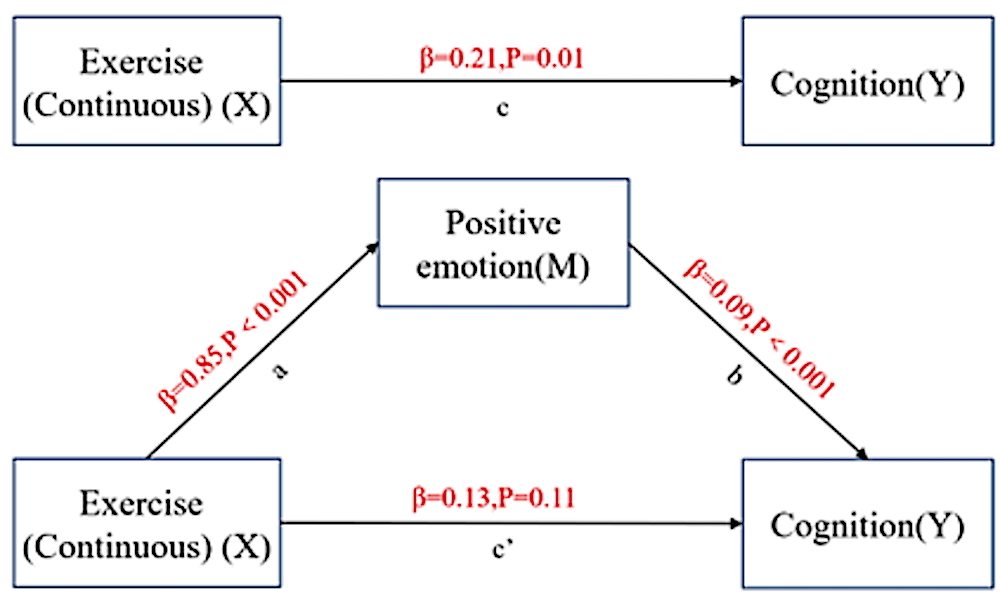Current issue
Archive
Manuscripts accepted
About the Journal
Editorial office
Editorial board
Section Editors
Abstracting and indexing
Subscription
Contact
Ethical standards and procedures
Most read articles
Instructions for authors
Article Processing Charge (APC)
Regulations of paying article processing charge (APC)
PUBLIC HEALTH / RESEARCH PAPER
Association between continuous exercise and cognitive function in Chinese elderly with chronic diseases: the mediating role of positive emotions
1
Nanjing University of Chinese Medicine, China
These authors had equal contribution to this work
Submission date: 2024-06-28
Final revision date: 2025-02-17
Acceptance date: 2025-03-03
Publication date: 2025-04-27
KEYWORDS
TOPICS
ABSTRACT
Introduction:
Exercise has been proven to have a positive effect on improving cognitive function. However, the specific mechanisms by which exercise affects cognitive function states remain unclear. We aimed to explore the association between continuous exercise and cognitive function in Chinese elderly(age≥65)with chronic diseases and the mediating role of positive emotions.
Material and methods:
Data were obtained from 2018 waves of the Chinese Longitudinal Healthy Longevity Survey. We relied on the database entries for the types of chronic diseases to assess whether the samples had chronic diseases. We used logistic regression to verify correlations between exercise and cognition, and the Karlson-Holm-Breen Method (KHB) to verify the mediating role of positive emotions.
Results:
3959 samples were included in this study, of which 36.37% were <75 years old, 35.87% were 75-84 years old, and 27.76% were ≥85 years old; 46.70% were females and 53.30% were males. Logistic regression results showed that continuous exercise was significantly associated with an increase in cognition (β=0.21,P=0.01). About different domains of cognition, logistic regression results indicated that continuous exercise and non-continuous exercise are significantly associated with the growth of positive emotion (β=0.57,P<0.001; β=0.85,P<0.001). The results of regression and KHB methods indicated that positive emotions fully mediated the effects of continuous exercise on cognition, and partially mediated the effects of exercise on orientation.
Conclusions:
Exercise could improve levels of orientation of cognition of Chinese elderly with chronic diseases, and positive emotions mediated this effect. Only continuous exercise that produced positive emotions could have an impact on cognition ability.
Exercise has been proven to have a positive effect on improving cognitive function. However, the specific mechanisms by which exercise affects cognitive function states remain unclear. We aimed to explore the association between continuous exercise and cognitive function in Chinese elderly(age≥65)with chronic diseases and the mediating role of positive emotions.
Material and methods:
Data were obtained from 2018 waves of the Chinese Longitudinal Healthy Longevity Survey. We relied on the database entries for the types of chronic diseases to assess whether the samples had chronic diseases. We used logistic regression to verify correlations between exercise and cognition, and the Karlson-Holm-Breen Method (KHB) to verify the mediating role of positive emotions.
Results:
3959 samples were included in this study, of which 36.37% were <75 years old, 35.87% were 75-84 years old, and 27.76% were ≥85 years old; 46.70% were females and 53.30% were males. Logistic regression results showed that continuous exercise was significantly associated with an increase in cognition (β=0.21,P=0.01). About different domains of cognition, logistic regression results indicated that continuous exercise and non-continuous exercise are significantly associated with the growth of positive emotion (β=0.57,P<0.001; β=0.85,P<0.001). The results of regression and KHB methods indicated that positive emotions fully mediated the effects of continuous exercise on cognition, and partially mediated the effects of exercise on orientation.
Conclusions:
Exercise could improve levels of orientation of cognition of Chinese elderly with chronic diseases, and positive emotions mediated this effect. Only continuous exercise that produced positive emotions could have an impact on cognition ability.
Share
RELATED ARTICLE
We process personal data collected when visiting the website. The function of obtaining information about users and their behavior is carried out by voluntarily entered information in forms and saving cookies in end devices. Data, including cookies, are used to provide services, improve the user experience and to analyze the traffic in accordance with the Privacy policy. Data are also collected and processed by Google Analytics tool (more).
You can change cookies settings in your browser. Restricted use of cookies in the browser configuration may affect some functionalities of the website.
You can change cookies settings in your browser. Restricted use of cookies in the browser configuration may affect some functionalities of the website.



